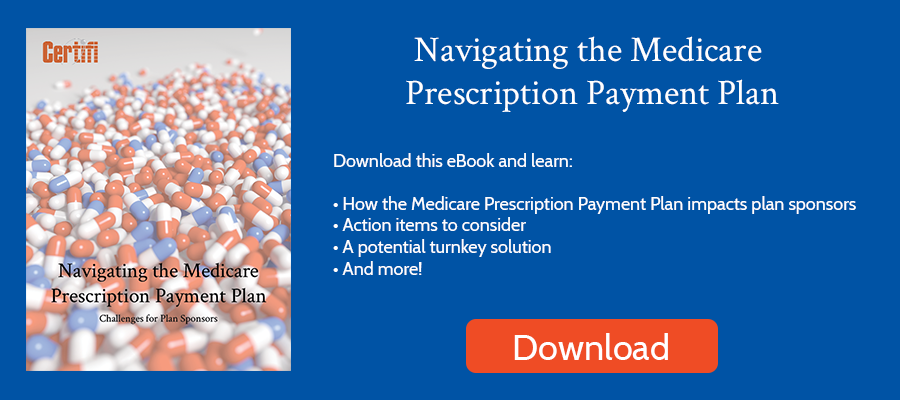The Centers for Medicare and Medicaid Services (CMS) proposed and enacted several Medicare Advantage Rules in 2023, shaping the landscape for health plans in 2024 and beyond. From electronic prior authorization to Star Ratings to a new prescription payment plan, health plans face several new Medicare Advantage rules.
We wrote about these potential changes – and their impact – throughout 2023. Here’s an overview of key proposed and finalized modification CMS released in 2023:
Electronic Prior Authorization Rule
In late 2022, the Centers for Medicare and Medicaid Services (CMS) released proposed rules titled Advancing Interoperability and Improving Prior Authorization Processes. The comment period for the proposed rule expired in March of 2023, but CMS has not finalized the rules.
Among the rules proposed in the release, the most impactful may be those related to electronic prior authorization. The proposed rule mandates Medicare Advantage, Medicaid managed care, Affordable Care Act plans, and state Medicaid agencies to simplify prior authorization procedures. CMS proposed the creation of a FHIR API by payers, facilitating providers to:
- Check the insurer’s system to ascertain prior authorization necessity, excluding drugs.
- Assist providers in fulfilling data requirements by delivering request documentation.
- Furnish the status of prior authorization requests.
- Specify reasons for any denials.
Both payer and provider trade organizations reacted positively to the proposed electronic prior authorization rules.
CMS proposed that these requirements go live by 2026.
For more information, read our resource titled What the Proposed Electronic Prior Authorization Rule Means for Health Insurers.
Consolidated Appropriations Act of 2023
President Biden signed the Consolidated Appropriations Act of 2023 into law in late 2022. The $1.7 trillion spending bill funds the government for the 2023 fiscal year and extends certain Medicare telehealth flexibilities.
The pandemic prompted CMS to expand telehealth coverage for Medicare seniors, offering a safer healthcare option during the pandemic. Initially tied to the COVID-19 public health emergency (PHE), CMS expected telehealth benefits to last 151 days post-PHE.
The Consolidated Appropriations Act of 2023 decoupled Medicare telehealth flexibilities from the PHE but set an expiration in 2024.
These flexibilities include removing geographic restrictions, broadening originating sites, extending provider eligibility, permitting audio-only telehealth, and facilitating telehealth for hospice care recertification.
You can learn more in our resource titled Three Ways the Consolidated Appropriations Act of 2023 Impacts Medicare and Medicaid.
Star Ratings
In late 2022, CMS proposed significant modifications to the Medicare Advantage Star Ratings program through the Contract Year 2024 Policy and Technical Changes.
One change, effective from 2024, involves using the Tukey methodology for outlier deletion. This change impacts the location of Star Rating cut points.
Another alteration for 2026 involves reducing the weighting of the Patient Experience/Complaints and Access to Care measures by half. The change addresses concerns about the disproportionate influence of these measures.
Furthermore, the hold harmless clause for improvement measures will only apply to 5-star plans. The change could potentially lead to rating decreases for 4 and 4.5-star plans.
The 2024 proposals also suggest the removal of cut point guardrails, reinstating two Star Rating measures, and adding four new measurements related to kidney health, opioid and benzodiazepine use, anticholinergic medications, and central nervous system active medications.
In 2027, CMS will introduce a Health Equity Index Reward to address social risk factors. This change could potentially reshape incentives for consistent performance across measures.
You can learn more about these rule changes in our resource The Future of Medicare Advantage Star Ratings.
RADV Final Rule
In January 2023, CMS released a final rule regarding Medicare Advantage risk adjustment data validation (RADV). The rule impacts audits that ensure the accuracy of payments to Medicare Advantage health plans.
Medicare Advantage plans are paid monthly based on the health status of enrolled beneficiaries. Risk adjustments are made to account for differences in health status among them. CMS established the RADV Program to validate risk adjustment data submitted by Medicare Advantage organizations, employing random beneficiary samples and audits of medical records. The recent final rule introduces modifications in three key areas.
First, CMS plans to use an undefined but statistically valid extrapolation method to recapture overpayments. It will audit a sample and extrapolate it to the entire population. This change limits the extrapolation of audit results to the 2018 plan year.
Second, some plans sought an adjustment using a Fee for Service (FFS) Adjuster. CMS determined it unnecessary, opting not to apply an FFS adjuster to payment calculations.
Finally, the final rule mandates Medicare Advantage plans remit overpayments as specified by CMS. Repayments will be collected through adjustments to regular monthly payments.
The rule’s impact is substantial, potentially requiring significant repayments from Medicare Advantage plans. It elicited strong opposition from health plan associations like AHIP and the Alliance of Community Health Plans.
You can learn more about the RADV Final Rule in our resource titled The Impact of the Medicare Advantage RADV Final Rule on Health Plans.
Medicare Advantage Final Rule
On April 5, 2023, CMS finalized the 2024 Medicare Advantage Final Rule, effective June 5, 2023. Key areas addressed include:
- Utilization Management – CMS emphasizes adherence to Medicare National Coverage Determinations and Local Coverage Determinations, requiring plans to post internal coverage criteria.
- Prior Authorization – Prior authorization must be valid for the duration of medical necessity. Also, plans must ensure a 90-day transition period for enrollees changing plans. Additionally, CMS mandates the establishment of a committee to review utilization management policies.
- Marketing – New rules enhance beneficiary protections, restricting sales agents’ calling frequency and emphasizing the explanation of enrollment effects. CMS aims to improve transparency and oversight by requiring organizations to list all represented Medicare Advantage plans. Marketing about savings based on comparisons or using superlatives is prohibited, and third-party marketing organizations must create an oversight plan.
- Star Ratings – The Star Ratings Program sees changes like introducing a health equity index for 2027, reducing the weight of some measures, and removing the 60 percent rule for extreme circumstances.
- Health Equity – CMS expanded cultural and linguistic considerations in provider directories and required digital health education.
- Behavioral Health Access – Improvements involve the evaluation of Clinical Psychology and Licensed Clinical Social Work in network adequacy reviews and including some behavioral health services as emergency services without prior authorization.
These changes aim to enhance beneficiary care, transparency, and access while shaping the quality landscape of Medicare Advantage plans. You can learn more in our resource titled 2024 Medicare Advantage Final Rule.
Medicare Prescription Payment Plan
The Inflation Reduction Act introduced the Medicare Prescription Payment Plan, allowing Medicare beneficiaries to spread prescription drug costs throughout the year rather than paying all at once at the point of sale. While beneficial for beneficiaries with high prescription costs early in the year, it poses significant operational challenges for Medicare Part D plan sponsors.
Challenges include:
- Promotional communication and enrollment requirements – Plan sponsors must navigate complex communication and enrollment processes, including creating promotional materials and offering multiple enrollment mechanisms.
- Calculating bills and sending invoices – They must adhere to defined monthly billing rules, calculate caps for the first and subsequent months, and facilitate various payment options.
- Delinquency communications – Delinquency notifications and termination notices must be sent promptly, with a grace period offered.
- Financial considerations impacting profitability – Health plans should be aware that the plan could increase utilization, introduce cash flow concerns, force health plans to manage bad debt, and impact Star Ratings.
CMS expects to release additional draft rules detailing communication requirements in early 2024, with final rules published by spring or early summer 2024. CMS plans for the plan to go live on January 1, 2025.
You can learn more at Navigating the Medicare Prescription Payment Plan: Challenges for Plan Sponsors.
Medicare Advantage Proposed Rules: Agent and Broker Compensation, Behavioral Health, Health Equity, and Supplemental Benefit Communication
On November 15, 2023, CMS introduced proposed rules for Medicare Advantage plans. The proposed rule addressed:
- Agent and broker compensation – CMS aimed to counteract potential bias in large organizations by proposing the elimination of incentives affecting objectivity. CMS included changes in payment caps and the definition of administrative payments within compensation calculations. Effective in 2025, these changes intend to enhance market fairness and transparency.
- Behavioral health care access – CMS proposed extending network adequacy standards to include Outpatient Behavioral Health, specifying time and distance standards based on county types. CMS aims to ensure adequate resources for psychiatry, clinical psychology, clinical social work, and inpatient psychiatric facility services, improving behavioral health service accessibility for Medicare Advantage beneficiaries.
- Mid-year enrollee notifications – To boost benefit use, CMS proposed a mid-year enrollee notification rule targeting underutilized supplemental benefits. It directs Medicare Advantage plan sponsors to send mid-year notices between June 30 and July 31, starting from January 1, 2026. These notices should inform beneficiaries of unused supplemental benefits, including scope, cost-sharing, access instructions, and provider information. To boost benefit utilization, CMS emphasizes better communication from plans.
- Health equity – The health equity analysis proposal intends to address potential disparities caused by utilization management practices like prior authorization. CMS suggests the inclusion of a health equity expert in Utilization Management Committees, with an annual analysis focusing on low-income, dual-eligible, and disabled populations. This analysis, released on plans’ websites, would assess the approval rates and timeframes for standard and expedited prior authorization requests.
The comment period for these proposed rules extends until January 5, 2024.
You can learn more in our resource titled Medicare Advantage Proposed Rules: Agent and Broker Compensation, Behavioral Health, Health Equity, and Supplemental Benefit Communication.
Certifi’s health insurance billing and payment solutions help Medicare Advantage payers improve member satisfaction while reducing administrative costs.



